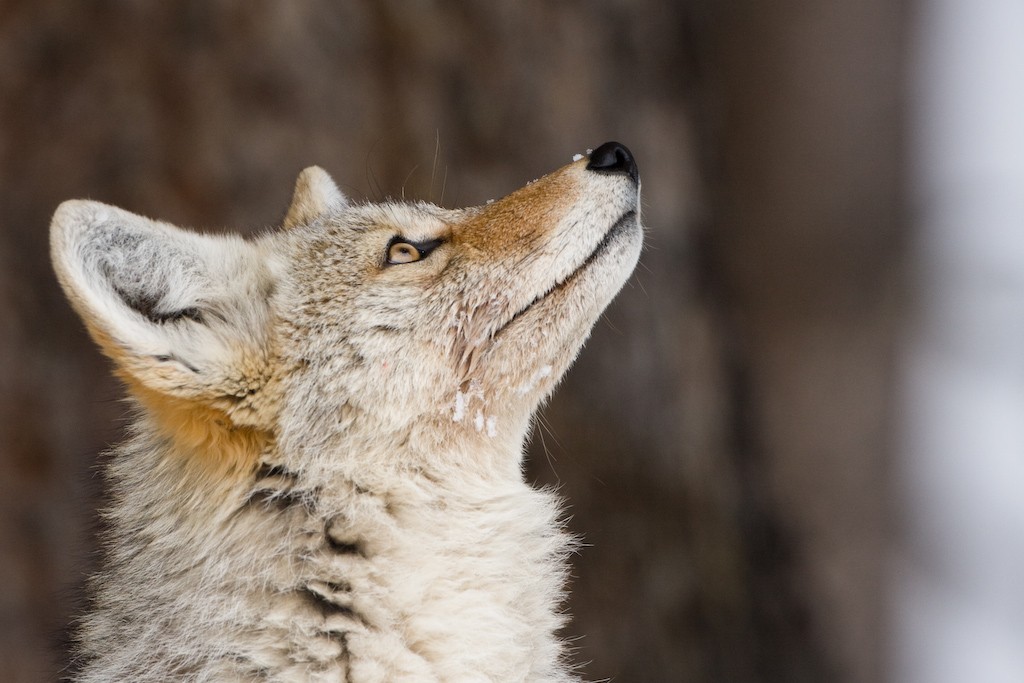
Four years ago, a photo appeared across my Facebook feed, showing about 300 dead, bloody coyotes strung up on a fence. I thought this photo must be from the 1950s or 60s, but what I was seeing was a coyote-killing contest, which are held many times a year in forty states. Wisconsin alone has held 41 contests in the last two years.
In such a contest, prizes are awarded in different categories such as: the most animals killed, the smallest, the largest, etc. The targets of these contests include any predators not currently listed under the Endangered Species Act, as well as fur-bearers, crows, doves and other birds.
On February 8th, State Senator Fred Risser introduced SB30 (Companion Bill HB29) opposing contests for killing wild animals in Wisconsin. Three states – California, Vermont and New Mexico – have already banned these contests; an active challenge in Arizona is ongoing.
The determination as to whether SB30 Bill gets heard lies with the members of the Senate Sporting Heritage, Mining and Forestry Committee, headed by Senator Tom Tiffany. Senator Tiffany has stated that he believes there may be as many as 20,000 coyotes in Wisconsin and that coyote-killing contests are a legitimate and necessary method of predator control. Senator Tiffany did not respond to a request for the source regarding his estimated 20,000 coyotes.
Predator control is the usual justification given to defend these contests. While I am not a wildlife biologist, those that I have spoken too clearly state that predator populations are self-limiting by the availability of habitat and food sources. Ending wildlife-killing contests will in no way impact an individual’s right to hunt coyotes or any other legal predator.
The bill would make it illegal to organize or sponsor a contest, provide the venue for a contest, or participate in a contest. The first two offenses would be more serious, with fines between $1,000 to 2,000; the last lesser, with fines up to $500. The bill clearly defines a contest as “an organized or sponsored competition with the objective of taking, capturing, or killing a wild animal for entertainment or for the chance to win designated prizes.” This definition does not apply to fishing tournaments run with the proper permits.
As it is, contests are often kept secretive, with locations and dates shared only among organization members. Contests have cute names such as the “Santa Slay” held in Arizona this past winter, or the “Fur Bang,” a contest held in Washburn, Wisconsin. Often the sponsors donate a portion of the proceeds to a local charitable organization, to inspire goodwill in the community.
To make contests more acceptable to the public, they are promoted as hunting events. But what differentiates hunting from a blood sport? Jim Posewitz’s 2002 book Beyond Fair Chase: The Ethic and Tradition of Hunting explains that in a blood sport, the animal has little to no chance of escape, and the killing is wanton and inhumane.
In a contest, coyotes are “called in” with devices that sound like pups in distress. When the animal comes into view, it is shot, often with a military assault weapon with a scope, such as an AK-47 or AR-15. These weapons have a range up to 1,890 feet, or five football fields. For coyotes – or any wild animal deemed acceptable spoils of such contests – there is little chance of escape.
In the rush to kill as many animals as possible within a short amount of time, many animals are gut shot. They are left to die slowly until gathered, explained Carter Niemeyer, a former Director of USDA Wildlife Services for Idaho, Wyoming and Montana. This practice is certainly inhumane. Lastly, most of the bodies of the coyotes are left in dumpsters, or in piles on the earth to rot or be eaten by scavengers, including American and Golden eagles. Lead poisoning, which is almost always fatal in large raptors, is a clear danger. According to Niemeyer, in more than 80 percent of cases, the coyotes are so shot up or emaciated that their fur is useless and not marketable. There’s no usefulness to the killing, meaning it is wanton.
If you are concerned about the continuation of these contests in our state, please contact Senator Tom Tiffany and the other five members of the Sporting Heritage Committee and voice your opinion.
By Susan Libby. Photo of coyote by Will Sebastian.